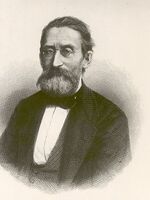Schiefner, A.: Difference between revisions
m (Text replace - "publicationtype" to "classification") |
No edit summary |
||
| (2 intermediate revisions by 2 users not shown) | |||
| Line 1: | Line 1: | ||
{{Person | |||
|MainNamePhon=Anton Schiefner | |||
|SortName=Schiefner, Anton | |||
|namefirst=Anton | |||
|namelast=Schiefner | |||
|OtherNames=Franz Anton von Schiefner | |||
|PersonType=Editors | |||
|bio=Franz Anton (von) Schiefner (Russian Антон Антонович Шифнер, Anton Antonovič Šifner) was a Baltic German linguist and ethnologist. He is considered one of the founders of Uralistics, Tibetology, Mongolian Studies and Caucasian Studies. | |||
Anton Schiefner was born into a Baltic German merchant family in Reval. The family had immigrated to Estonia from Bohemia . After graduating from the Knights and Cathedral School in Reval (Tallinn), he studied law at the University of St. Petersburg from 1836 to 1840 and Oriental Studies at the University of Berlin from 1840 to 1842. | |||
From 1843 Schiefner was a teacher of Latin and ancient Greek at a grammar school in Saint Petersburg, from 1863 librarian and later library director at the St. Petersburg Academy of Sciences. From 1852 he represented the subject of Tibetology at the Academy, of which he was an associate member from 1854 until his death. From 1860 to 1873 he simultaneously held a professorship in Latin and Greek at the Roman Catholic Seminary. In the years 1863, 1865 and 1878 he stayed in England for research purposes. In 1866 he was appointed Real Councilor of State. Schiefner was a corresponding member of the Finnish Literary Society. | |||
== | With numerous publications, Schiefner has made a significant contribution to research into Tibetan and Mongolian. Milestones were his editing of the New Testament in Mongolian and the translation of Buddha texts from Tibetan. In addition, Schiefner was one of the best experts on Finno-Ugric languages of his time. He is famous for his translation of the Finnish national epic ''Kalevala'' under the title ''Kalevala, the national epic of the Finns'', the first translation into the German language (1852). Between 1853 and 1862 he published the work of the young man in twelve volumes Matthias Alexander Castrén, who laid the foundation for academic study of the Finno-Ugric and Samoyedic languages of Russia. In addition, Schiefner devoted himself to the languages of the Caucasus and topics of Indology. ([https://de.wikipedia.org/wiki/Anton_Schiefner Source Accessed Aug 25, 2023]) | ||
|images=File:Schiefner Anton-Wikipedia.jpg | |||
|bornin=Reval | |||
|classification=People | |classification=People | ||
}} | }} | ||
Latest revision as of 12:31, 25 August 2023
| PersonType | Category:Editors |
|---|---|
| FirstName / namefirst | Anton |
| LastName / namelast | Schiefner |
| MainNamePhon | Anton Schiefner |
| SortName | Schiefner, Anton |
| bio | Franz Anton (von) Schiefner (Russian Антон Антонович Шифнер, Anton Antonovič Šifner) was a Baltic German linguist and ethnologist. He is considered one of the founders of Uralistics, Tibetology, Mongolian Studies and Caucasian Studies.
Anton Schiefner was born into a Baltic German merchant family in Reval. The family had immigrated to Estonia from Bohemia . After graduating from the Knights and Cathedral School in Reval (Tallinn), he studied law at the University of St. Petersburg from 1836 to 1840 and Oriental Studies at the University of Berlin from 1840 to 1842. From 1843 Schiefner was a teacher of Latin and ancient Greek at a grammar school in Saint Petersburg, from 1863 librarian and later library director at the St. Petersburg Academy of Sciences. From 1852 he represented the subject of Tibetology at the Academy, of which he was an associate member from 1854 until his death. From 1860 to 1873 he simultaneously held a professorship in Latin and Greek at the Roman Catholic Seminary. In the years 1863, 1865 and 1878 he stayed in England for research purposes. In 1866 he was appointed Real Councilor of State. Schiefner was a corresponding member of the Finnish Literary Society. With numerous publications, Schiefner has made a significant contribution to research into Tibetan and Mongolian. Milestones were his editing of the New Testament in Mongolian and the translation of Buddha texts from Tibetan. In addition, Schiefner was one of the best experts on Finno-Ugric languages of his time. He is famous for his translation of the Finnish national epic Kalevala under the title Kalevala, the national epic of the Finns, the first translation into the German language (1852). Between 1853 and 1862 he published the work of the young man in twelve volumes Matthias Alexander Castrén, who laid the foundation for academic study of the Finno-Ugric and Samoyedic languages of Russia. In addition, Schiefner devoted himself to the languages of the Caucasus and topics of Indology. (Source Accessed Aug 25, 2023) |
| BornIn | Reval |
| Other wikis |
If the page does not yet exist on the remote wiki, you can paste the tag |

